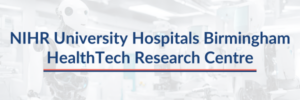
The National Institute for Health and Care Research (NIHR) has awarded almost £3 million of funding to University Hospitals Birmingham (UHB) to become a HealthTech Research Centre (HRC). The NIHR has awarded £42 million of government funding to establish 14 new centres across England that will drive life-changing research into health technologies. The UHB HRC will work closely with the other 13 new HealthTech Research Centres funded to bring industry, academia and the health and care system together.
The UHB HRC will commence in April 2024, replacing the successful NIHR Trauma Management MedTech Co-Operative (MIC). Professor Tom Clutton-Brock, Director of the new NIHR UHB HRC, said:
“We are delighted that University Hospitals Birmingham NHS Foundation Trust (UHB) has been selected to host one of the 14 new NIHR HealthTech Research Centres (HRCs). The HRCs will work with businesses to support the development of medical devices, diagnostics and digital technologies. UHB has hosted an NIHR Health Technology Cooperative (HTC) and then an NIHR MedTech Cooperative (MIC) for the last 11 years. The £3m HRC award will allow us to continue to work with an expanded team and objectives for another 5 years.
Our core themes of Medical Devices, Digital & Data and Robots & Autonomous Systems are led by world class academics from the University of Birmingham, University Hospitals Birmingham and Imperial College London. The themes each include the cross-cutting areas of Human Factors & Usability, Health Economics & Value Proposition, and Regulations, with leads from the University of Birmingham and Health Innovation West Midlands.
The £42m investment into the HRCs across England is a clear recognition of the value these centres will bring to health and social care over the next few years”
The outgoing Health and Social Care Secretary, Steve Barclay, said:
Read more about the HRCs on the NIHR’s website here.

